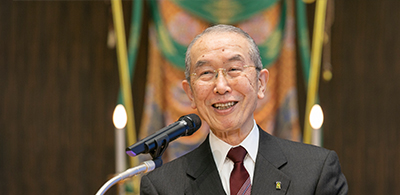Eat in Moderation for a Healthy
October 2014

Know the Right Amount to Eat
At present in Japan food equivalent to 60 meals (about 15 kilograms) per person is discarded annually. This is called “food loss.” So much still edible food is wasted. This truly is a shame. And yet so many of us are now obese or overweight, or suffering from illnesses caused by our lifestyle habits, that it seems we are paying a heavy price for our wasteful overconsumption at a time when ample supplies of food are available.
I am reminded of the old story about a king of a certain country. Having eaten until his stomach felt completely full, he experienced some discomfort and heaved a great sigh. Seeing this, a wise man gave him these words of advice:
“People who always keep their hearts and minds calm and know the right amount to eat experience few pains, age gracefully, and live long lives.”
The king, who was concerned about physical decline and poor health, deeply reflected on the words of the wise man, and by repeating them to himself at mealtimes gradually reduced the amount he ate and soon enjoyed robust health.
In fact, this was a legendary exchange between Shakyamuni and the King of Kosala some 2,500 years ago, but it teaches us something important that is equally true for people today. Above all, it is the tragedy of human beings at the mercy of their desires. Our hearts and minds leap when we see an “All you can eat” sign in front of a restaurant, so we are just like the king. In fact, we should learn the amount to eat that is appropriate to our age and condition, and at each and every meal should be careful not to overeat. In this story, Shakyamuni is teaching us the fundamental way to live. Recent medical research indicates clearly that following a light diet has definite health benefits. Some experts say the perfect amount to eat in one’s 50s is just enough so that the stomach feels about 60 percent full, and in one’s 60s to feel about 50 percent full.
While regularly eating less and keeping to a simple diet are considered to be healthy, doing so too strictly could lead to malnutrition, so people in their mid-70s and older should exercise caution.
Recite Thanks Before Meals
I have quoted above the phrase of Shakyamuni as a wise man, “always keep… hearts and minds calm.” This involves seeing things correctly based on wisdom and accepting them from a broad perspective. What, then, do we see with such eyes when we look at the food placed before us?
We see first of all the reality of receiving the lives of animals and plants. And then, we see the hard work of the people who have cultivated nature’s bounty, processed it, and delivered it to us, as well as the thoughtfulness of the people who have prepared it as food. Some people might now feel, in seeing a bowl of miso soup, the thoughtfulness of a mother who carefully made soup stock for the miso soup every day, despite her impoverished circumstances, in order to provide them nourishment when they were growing children with developing bodies. Some people might think, when seeing a bowl of rice placed before them, of their gratitude for the good health implied by a naturally strong appetite. And there may be other people whose thoughts turn to those who cannot obtain even one meal a day, and feel anew the happiness of their current circumstances. They may then think of what they can do to help those in need.
When we do not gobble down our food by force of habit, but instead face a meal with a calm heart and mind, we can awaken to a sense of gratitude.
Then, as we become aware of the ill effects from eating more than we need of the things we like, we naturally will start to eat in moderation, helping us maintain a healthy condition. Of course, it goes beyond saying that gratitude fosters a heart and mind that respect the sanctity of life and are the starting point for developing a healthy heart and mind.
Regarding the problem of “food loss” that I mentioned at the beginning, in my family we are making an effort to buy foods that are approaching their freshness expiration date. By doing so, we feel that we are reducing the number of things that would otherwise pass their freshness date and be discarded. Following such a practice is also an incentive to eat in moderation. In Rissho Kosei-kai, before beginning to eat we recite the “Grace Before Meals,” which gives us as human beings, who are easy prey for our desires, the opportunity to call to mind what is important.
Let’s recite aloud, “For what we are about to eat and drink, we are grateful to the Buddha, to nature, and to many people,” put our hearts and minds in good order, and enjoy our meals. Because eating is something we naturally do every day, developing healthy habits is of great importance.
Back Number



